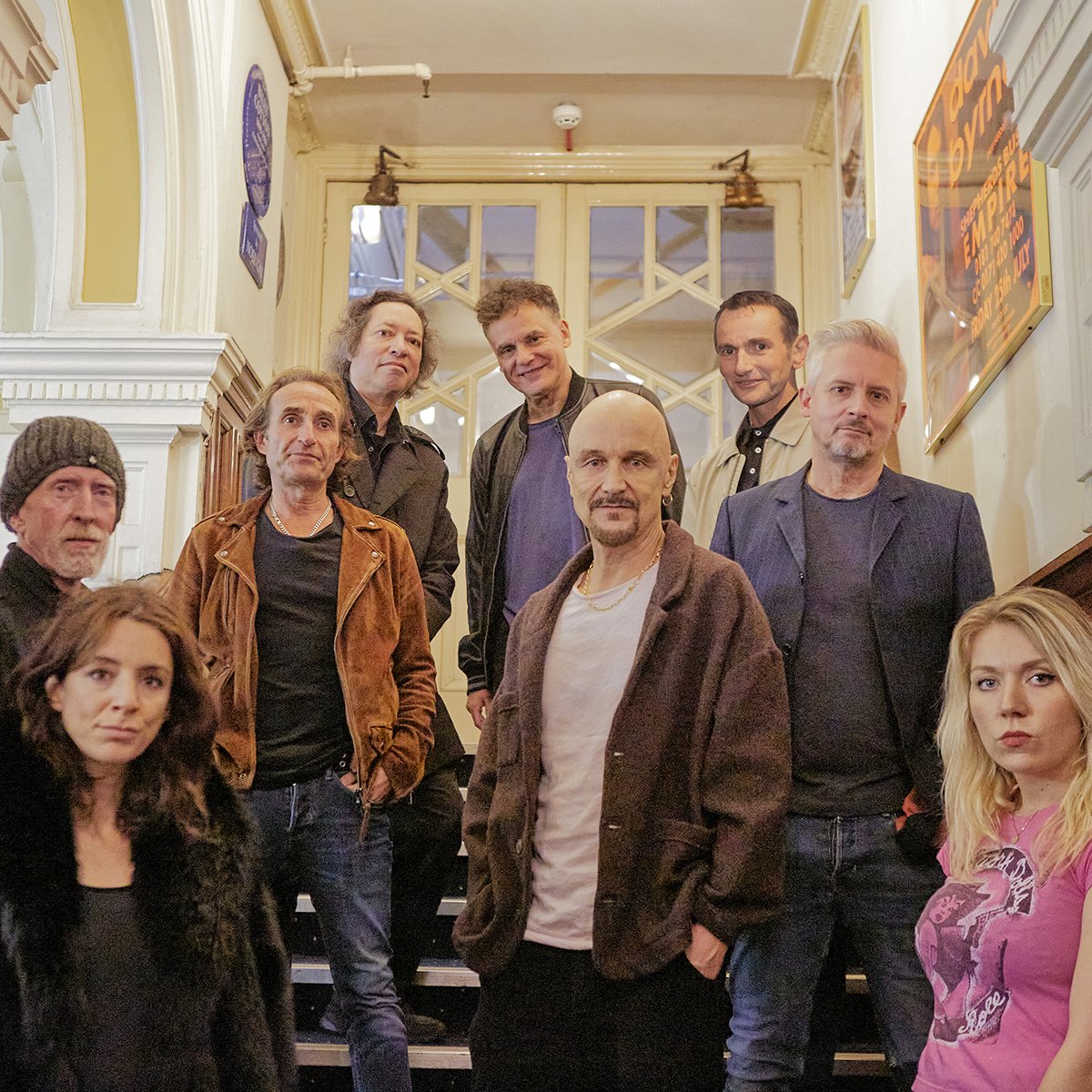James release Yummy 18th album.
L-R: David Baynton-Power, Chloe Alper, Saul Davies, Adrian Oxaal, Mark Hunter, Tim Booth, Jim Glennie, Andy Diagram, Deborah Knox-Hewson. Image: Paul Dixon.
Formed in Manchester in 1982, rock band James have been making best-selling records and legendary live performances for over forty years. Founding member and bassist Jim Glennie joined us to discuss their eighteenth studio album, Yummy, which is released today, with a UK arena tour to follow in June.
Of nine current bandmembers, four make up the songwriting team: Tim Booth, Saul Davies, Mark Hunter and Glennie, who describes it as an ongoing and sporadic process which starts with several jam sessions. Lead vocalist Booth rarely sings the final lyrics, or any real words at all, at this stage. “Sometimes he’ll come up with phrases that are nonsensical; other ones, he’ll come up with a lyric that he’ll use, but mostly it's phonetics. It’s like he’s contributing the sounds of his instrument.” Although Davies is also the band’s violinist and percussionist, he mostly plays guitar in the jams, where the focus is more on chordal structures than top melodies. Keyboard player Hunter is “our unsung hero,” says Glennie. “He holds everything together technically and musically – he’s just a genius, he's got such a good ear. Me and Saul are a bit more wayward, which is kind of good because you end up with weird things happening because we don’t know what we’re doing.”
These initial improvisations are mostly instinctual and uninterrupted, with the more intellectual phase coming later. “When you start working on the demos, then you sit there studying problems and issues. But in the jam, it's just about enjoying it, being there with it, trying to do something different. You’re looking for a door: you kind of hover, you’re looking for someone to leap out or stumble out, and off you go in another direction.” From the first beat of the drum machine, everything is recorded on a multitrack, producing some 80 or 90 jams of up to an hour in length, which are then edited down to make manageable demos. At this point, Glennie says, “Everything’s up for grabs. You can add things to it, you can speed it up, you can change the rhythm. It becomes very creatively fluid.”
“Bands don’t want that at all, especially live – they don’t want things to go wrong. The way you get rid of that is to rehearse the life out of everything, but it makes it a sterile experience, something we never ever wanted”
Inevitably, with four songwriters, there are disagreements. “Saul is quite explosive, really creative, wants to throw everything up in the air. Mark’s the opposite: he’s more like, ‘We need to focus in, we need to come up with a clear direction.’” Glennie says that they manage to move things forward through frequent discussions, sometimes putting decisions to a vote, but that the key driver is mutual respect. “When you work on a song you get attached to it, and to have it dismissed or someone criticize it can be difficult, but you’ve got to be grown-up about it. Even if I'm completely and utterly convinced of something, if Tim, Saul and Mark disagree, it doesn’t matter. I mean, am I right? Am I going to use my 40 years’ experience against Tim’s 40 years, and Mark and Saul’s 30 years each?”
They also take on board contributions from the other bandmembers – Adrian Oxaal, David Baynton-Power, Andy Diagram, Chloë Alper and Deborah Knox-Hewson – as well as producer Leo Abrahams. James worked with Abrahams on their 2023 single “Love Make a Fool”, and the sound judgement he displayed then earned him their respect. “Leo was sensible enough to not strip it apart and rebuild it, to justify his existence. That got him the job really – he was impressive.” Although the songs had their own distinct characters by the time Abrahams received the demos, the band were happy to let him “pull things apart” if necessary. “If you're not going to allow the producer to do that, then there’s no point in bloody working with him, you may as well just finish it yourself. So we’re always open to them: ‘Ok, smash it up, do what you want to do.’”
Image: Elly Lucas.
However, James had their own overarching vision of Yummy. “We wanted it to be big, we wanted it to be uplifting. Some of the lyrics are kind of spiky, but we wanted people to be happy and to get a positive experience from this. There are those juxtapositions: Tim’s darker lyrics with uplifting music.” Typical examples include “Rogue” – “It's about Tim’s past life, regressions, and mixing in a lot of humour (‘You think I’d be wise after all these lies’)” – and “Mobile God”, which manages to be “joyous” even as Booth reflects on how much power has been surrendered to technology. “That was one that me and my brother Peter worked on. We're obviously in a happy mood!” Glennie has only recently voiced his admiration for their lyricist – “which is fucking ridiculous – I've been in the band with him for 40 years! I love his succinct little one-liners. What a great thing to be in a band if they have a singer singing lyrics that are important to you. And it’s a pop song – what better way to get some kind of message across to people?”
The deluxe edition of the album comes with a second CD, Pudding, featuring twelve of the demos that didn’t make it onto Yummy – although the term “demos” undersells songs that have often been worked on extensively before being dropped from the final tracklist. “People are allowed to beaver away and then go, ‘Ta-da!’ and they either find favour or they don’t, so they’re quite far advanced. The pool of songs that we aim to funnel towards the producers could be 20, and eventually it gets whittled down to the ones that you do take to completion. But we wanted these others to be heard.” Glennie hopes that they’ll give listeners an insight into their songwriting process, with many of the tracks retaining Booth’s non-verbal singing from the original jams. “You’ll see, ‘Ah, right, I see what they do.’ It’s not the finished article, but it’s that kind of halfway house.”
Glennie says that pure enjoyment of their songwriting method is one of the reasons they’re still making music, together with their long-held policy of risk-taking. “Bands don't want that at all, especially live – they don’t want things to go wrong. The way you get rid of that is to rehearse the life out of everything, but it makes it a sterile experience, something we never ever wanted.” In the past, they’ve given deliberately chaotic performances, occasionally even swapping instruments. “It's terrifying when something goes wrong – it’s like a bad trip. But you strengthen yourself, and you push and push, and that fear suddenly becomes kind of enjoyable, like a scary fairground ride.” He admits to some anxiety about the upcoming tour, knowing that new songs are unlikely to provoke the same noisy rapture as their best-known hits. “But you focus, you concentrate, you give it everything, and somehow it comes together. There’s some inspiration there that helps it to sparkle, helps it to shine.”
Glennie says they would always rather take that chance on new music than constantly play old favourites, which are regularly furloughed until they feel fresh again. They’ve just come back from Mexico where, following their own show in Guadalajara, they played the Vive Latino festival. “What a buzz – I mean, just ridiculous. If you want an uplifting experience, there’s no better job on the planet.” The thrill of live performance, the danger when they mix things up, the satisfaction of taking their music in new directions – these are the things that keep James in the game. “We’re not a band that looks over our shoulder. It’s about where we’re going next. We’re always either planning the next writing session or we’re working on things that we’ve written. It’s at the heart and essence of what we do: that ability to somehow, magically create something.”
Yummy is available now.
Author: Rachel Goodyear


